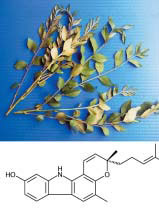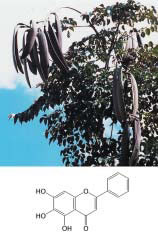Antimutagenicity of local vegetables in Thailand
Description
[Objectives]
Epidemiological studies have revealed that high consumption of fruits and vegetables reduces the risks of chronic diseases and cancer. In fact, cancer incidence rates in several Thai cities, where many indigenous plants and minor crops are utilized as food and medicine, are significantly lower than those of northern Europe and North America (IARC/ WHO). In this research, indigenous plants from Thailand were analyzed to determine their antimutagenic and/or anticancer effects.
[Results]
The antimutagenic activity against Trp-P-1 (3-amino-1,4-dimethyl-5H-pyrido[4,3-b]indole) of methanolic extracts of 108 species of edible Thai plants was examined by the Ames Test. The activity was evaluated by the amount of plant extracts which suppressed 90% of the mutagenesis (ED90). Five plants, Micromelum minutum (Thai name: yod mui), Oroxylum indicum (pheka), Cuscuta chinensis (sai mai), Azadirachta indica (sadao) and Litsea petiolata (thammang) exhibited significant activity with antimutagenic ED90 values lower than 5μL/plate (0.1 mg of dry plant material equivalent). M. minutum (Rutaceae) which showed the highest activity in the antimutagenic screening, is consumed mainly in the southern area of Thailand as a fresh vegetable served with thin rice noodles and spicy sauce, a meal commonly referred to as kanom-chin-nam-ya or kanom-chin-keang-tai-pla. Various parts of M. minutum, including edible twigs (Fig. 1), are also used as folk medicine to treat fever or dizziness. The activity-guided fractionation of the extracts resulted in the isolation of an active principle, which was identified as mahanine (Fig. 1) based on its physicochemical properties. Mahanine is a carbazole alkaloid derivative previously found in Murraya koenigii (curry leaf, consumed in South Asia), which is an allied species of M. minutum. Mahanine exhibited various bioactivities, including antimutagenicity against some heterocyclic amines (ED50 against Trp-P-1 was 5.2μM), cytotoxicity against a tumor cell line HL-60, and antimicrobial activity against Bacillus cereus and Staphylococcus aureus. Oroxylum indicum (Bignoniaceae), is a deciduous tree distributed throughout South Asia, Southeast Asia and China. The tree is used as a crude ingredient in traditional medicine for curing stomach disorders, diarrhea and rheumatic swelling. In Thailand, the fruits and flowers of the plant are consumed as a vegetable in the north and northeastern areas. The active constituent of the fruit of O. indicum responsible for antimutagenicity was baicalein (Fig. 2). The antimutagenic ED50 of baicalein against Trp-P-1 was 2.78μM. The high content of baicalein (4.0%, dry weight basis) is associated with the potent antimutagenicity of the original extract.
Figure, table
-
Fig. 1. Micromelum minutum twigs, and structure of the isolated antimutagen, mahanine. -
Fig. 2. Oroxylum indicum,and structure of the isolated antimutagen, baicalein.
- Affiliation
-
Japan International Research Center for Agricultural Sciences Food Science and Technology Division
- Classification
-
Technical A
- Term of research
-
FY2002 (FY2001-2005)
- Responsible researcher
-
NAKAHARA Kazuhiko ( Food Science and Technology Division )
Kameyama Mayumi ( National Food Research Institute )
KAKEN Researcher No.: 80353994ONO Hiroshi ( Biological Resources Division )
Yoshida Mitsuru ( National Food Research Institute )
KAKEN Researcher No.: 60353992ROY Molay Kumar ( JIRCAS Visiting Research Fellowship Program )
ALZOREKY Najeeb S. ( Sanaa University )
THALANG Vipaporn Na ( Kasetsart University )
Trakoontivakorn Gassinee ( Kasetsart University )
- ほか
- Publication, etc.
-
Nakahara, K., Trakoontivakorn, G., Alzoreky, N., Ono, H., Onishi-Kameyama, K. and Yoshida, M. (2002): Antimutagenicity of some edible Thai plants, and a bioactive carbazole alkaloid, mahanine isolated from Micromelum minutum. Journal of Agricultural and Food Chemistry, 50, 4796-4802.
Nakahara, K., Onishi-Kameyama, M., Ono, H., Yoshida, M. and Trakoontivakorn, G. (2001): Antimutagenic activity against trp-P-1 of the edible Thai plant, Oroxylum indicum vent. Bioscience, Biotechnology and Biochemistry, 65, 2358-2560.
- Japanese PDF
-
2002_17_A3_ja.pdf887.51 KB
- English PDF
-
2002_17_A4_en.pdf67.64 KB


